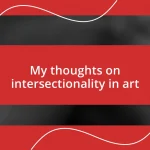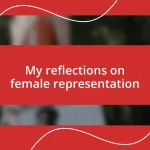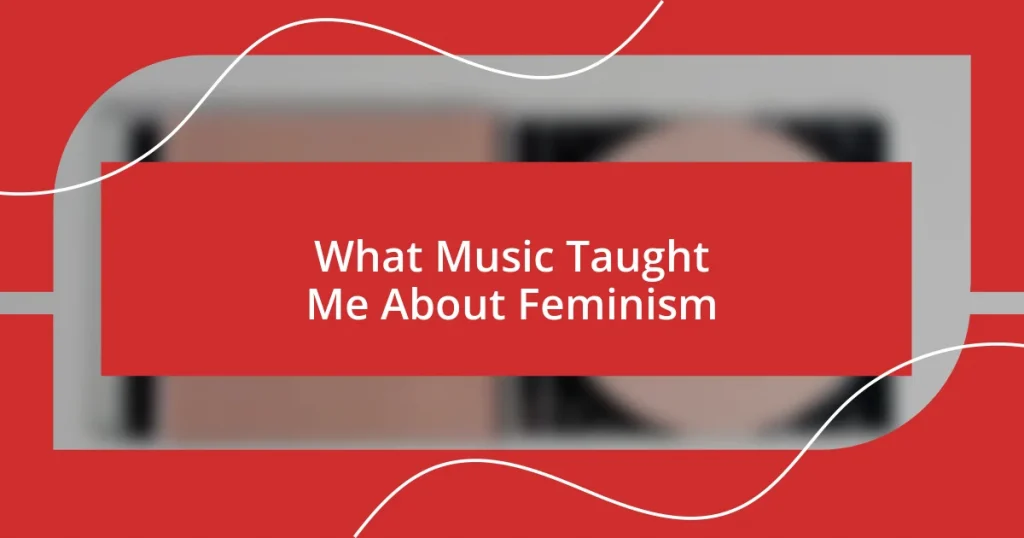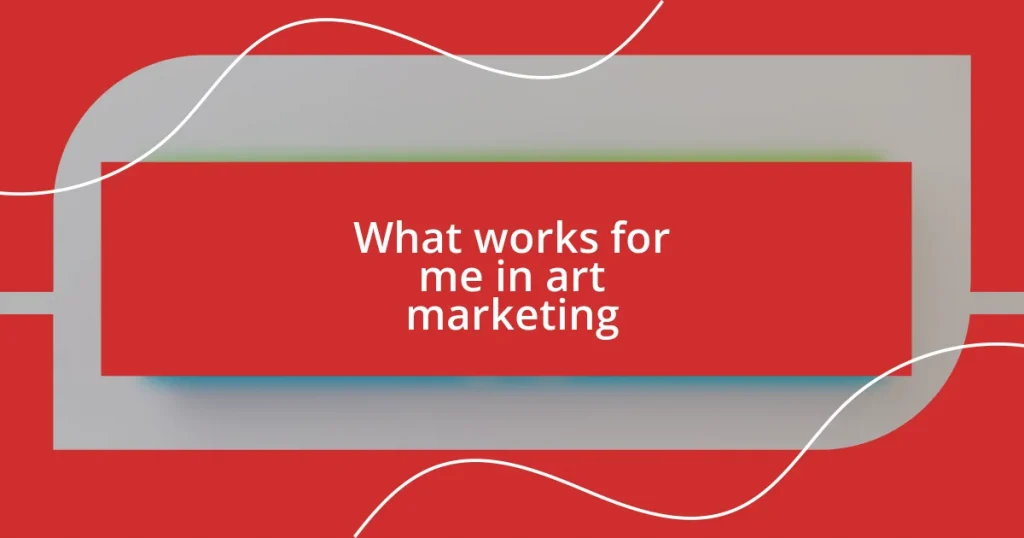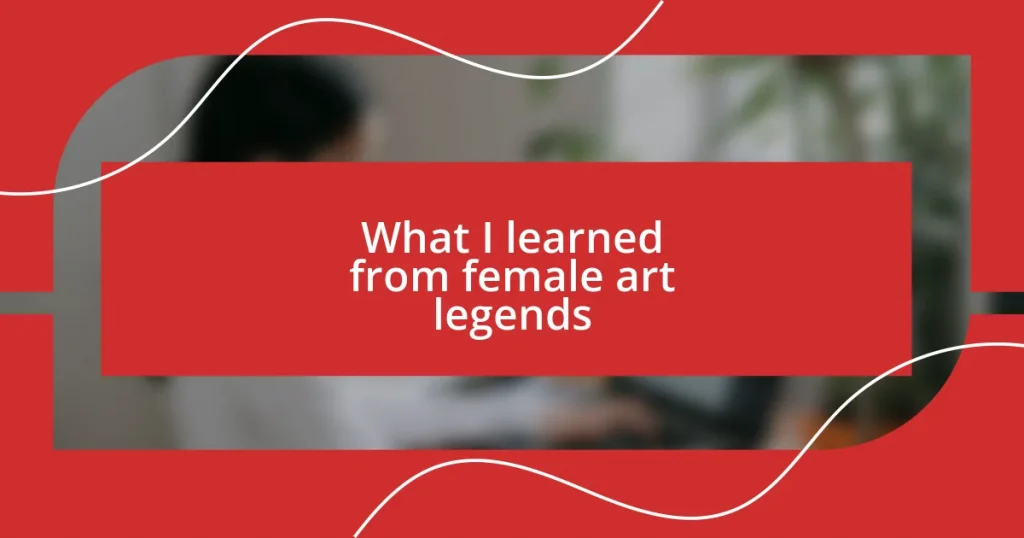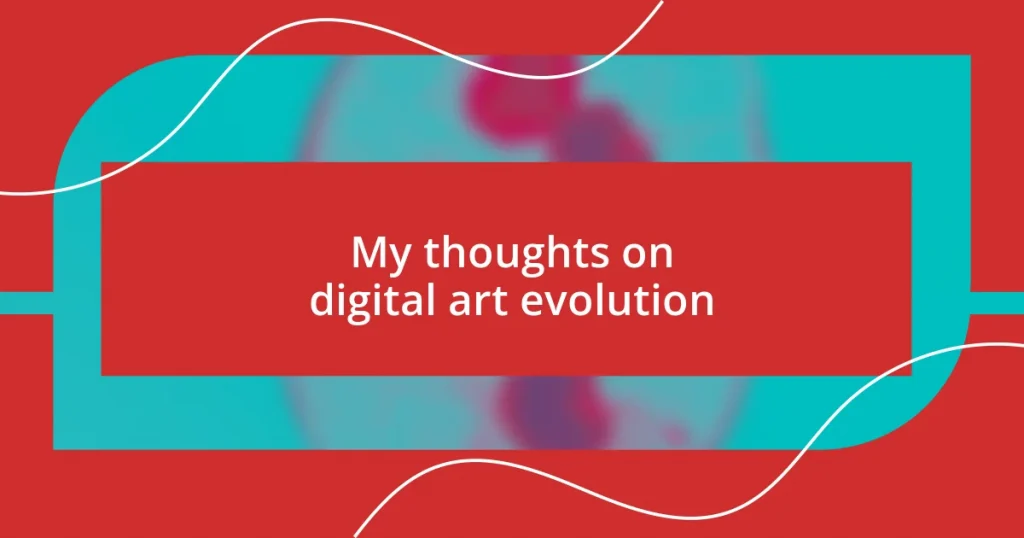Key takeaways:
- Music serves as a powerful medium for feminist expression, empowering individuals through lyrics that address body positivity, gender equality, and resilience.
- Influential female musicians, such as Billie Holiday and Nina Simone, have used their artistry to promote social change and elevate women’s voices in societal discussions.
- Connecting music with feminist movements highlights the intersection of art and activism, inspiring critical conversations and motivating listeners to pursue equality and self-acceptance.
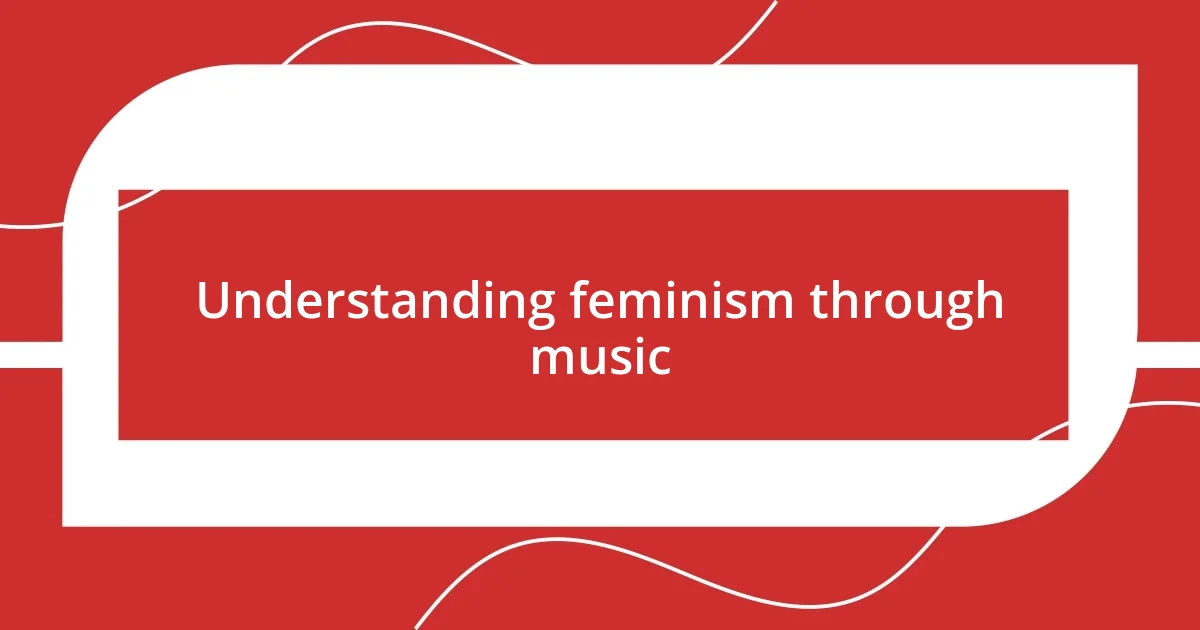
Understanding feminism through music
Music has a unique way of distilling complex themes into resonant messages, which is why I feel drawn to feminist anthems. When I listen to artists like Lizzo or Beyoncé, I’m reminded of the empowerment that comes from their words. Have you ever found yourself singing along, only to realize that the lyrics speak directly to issues of body positivity and gender equality? It’s remarkable how a catchy melody can convey such deep social commentary.
I vividly remember the first time I heard Alanis Morissette’s “You Oughta Know.” At the time, I was navigating my own tumultuous relationships, and her raw honesty struck a chord with me. The emotions she expressed made me understand that it was okay to be angry and assertive about one’s feelings — something that society often discourages in women. This powerful connection through music can challenge societal norms and encourage introspection.
Moreover, songs like “Fight Song” by Rachel Platten resonate as personal affirmations of strength and resilience. Each time I play it, I can’t help but feel a surge of motivation, prompting me to reflect on how music can shape our understanding of empowerment. Isn’t it fascinating how a simple song can propel us to both think critically about feminism and embrace our identities?
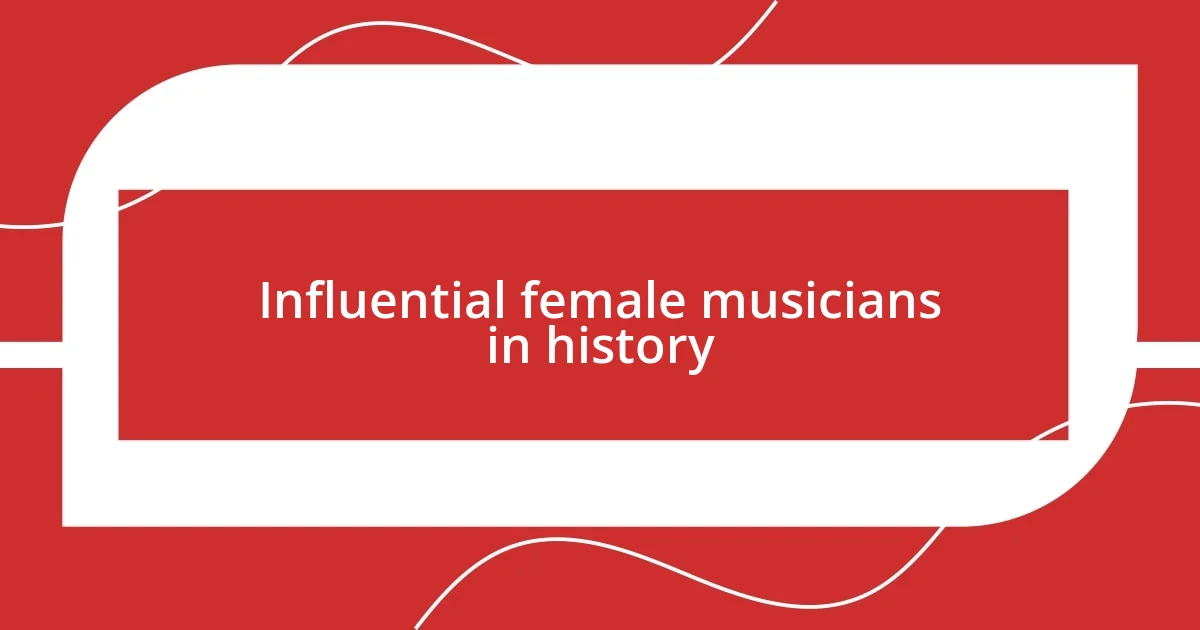
Influential female musicians in history
Music history is dotted with remarkable female musicians who challenged the status quo and paved the way for future generations. Their resilience and creativity inspired not only audiences but also societal change. For example, artists like Billie Holiday and Nina Simone used their voices to address racism and social injustice, reminding us that music can be a powerful tool for activism.
Here are a few influential female musicians who made a substantial impact:
-
Billie Holiday: Her poignant song “Strange Fruit” shed light on racial violence and remains a timeless protest anthem.
-
Nina Simone: With songs like “Young, Gifted and Black,” she gave voice to the civil rights movement and celebrated black identity.
-
Aretha Franklin: Known as the “Queen of Soul,” her music spurred conversations about civil rights and women’s empowerment.
-
Madonna: With her bold persona and innovative music, she challenged gender norms and championed sexual freedom in the 1980s.
-
Tina Turner: Her journey of overcoming abuse and reclaiming her identity inspired countless women to find strength and voice in their own struggles.
Each of these artists not only transformed the music industry but also elevated women’s voices in broader societal discussions. Reflecting on their stories, I’m often struck by how their music served as a form of resistance, urging me to embrace my own power in a world that sometimes tries to silence us.
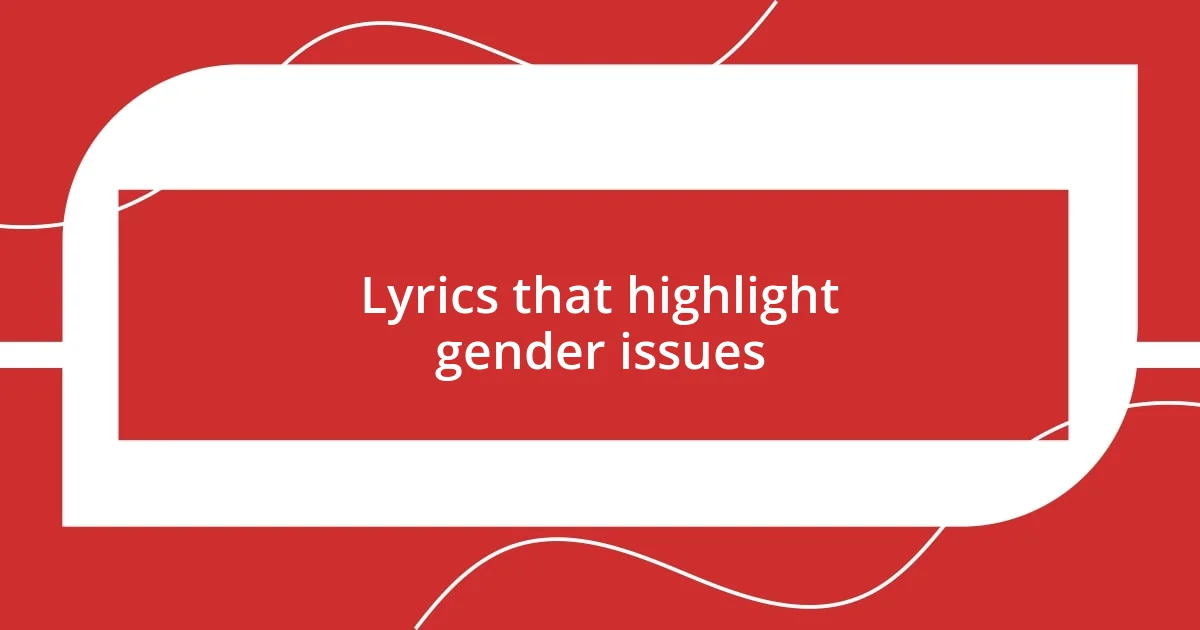
Lyrics that highlight gender issues
Listening to music has a way of making me more aware of the gender issues we face every day. When I reflect on songs like “Just a Girl” by No Doubt, I feel a mix of nostalgia and empowerment. The lyrics openly critique the stereotypical expectations placed upon women, making me realize just how deeply ingrained those messages are in our society. It reminds me of conversations I’ve had with friends who felt restricted by societal norms. Have you ever found a song that resonated with your own experiences in such a profound way?
One particular lyric that comes to mind is from Lizzo’s “Truth Hurts,” where she unapologetically declares her self-worth after a breakup. I cannot stress enough how liberating it felt the first time I belted it out in my car; I realized that every note was a celebration of autonomy and self-acceptance. It struck me that these lyrics do more than entertain—they offer a mantra for resilience in a world that often tells women to be less than they are.
In songs like “Girls Just Want to Have Fun” by Cyndi Lauper, the message is refreshing and empowering. It’s a call to freedom that celebrates female joy and agency. Personally, I’ve sung that song at countless gatherings, where it never fails to elicit smiles and camaraderie among friends. Those lyrics remind us that fun and pleasure are essential rights for everyone. They reinforce the idea that embracing our identities and experiences is an essential aspect of feminism.
| Artist | Song |
|---|---|
| No Doubt | Just a Girl |
| Lizzo | Truth Hurts |
| Cyndi Lauper | Girls Just Want to Have Fun |
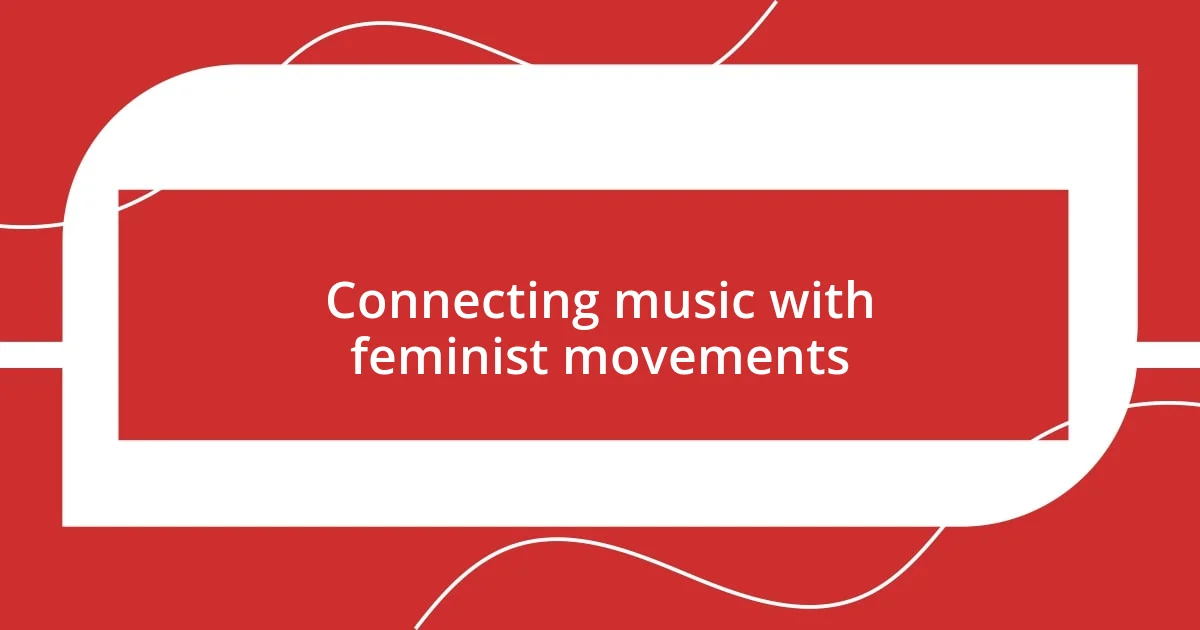
Connecting music with feminist movements
Connecting music with feminist movements is an incredibly powerful discussion, one that highlights the intersection of art and activism. I remember going to a music festival years ago, feeling invigorated by the performance of a female artist who spoke openly about her struggles with sexism in the industry. Hearing her passionate lyrics about empowerment made me realize how music can amplify feminist messages and unite listeners under a shared cause.
Songs have this unique ability to encapsulate the spirit of a movement, don’t they? I often think of rage anthems like “Killing in the Name” by Rage Against the Machine, which, while not explicitly feminist, has connections to anti-oppression ideologies. When I hear that song, I can feel the urgency in its message, urging listeners to confront societal injustices. It’s a reminder that music serves as both a mirror and a megaphone for social change, inspiring all of us to examine our own roles in the fight for equality.
I sometimes reflect on how music can spark conversations among friends about feminism. I recall an evening gathered around a fire, discussing Beyoncé’s “Flawless,” where she boldly proclaims her identity and self-acceptance. The conversations that followed were rich with reflections on our journeys toward loving ourselves. It struck me that through the empowerment of lyrics, music not only resonates with our experiences but also motivates us to push for a more equitable world. How has music inspired your own journey in feminist thought?
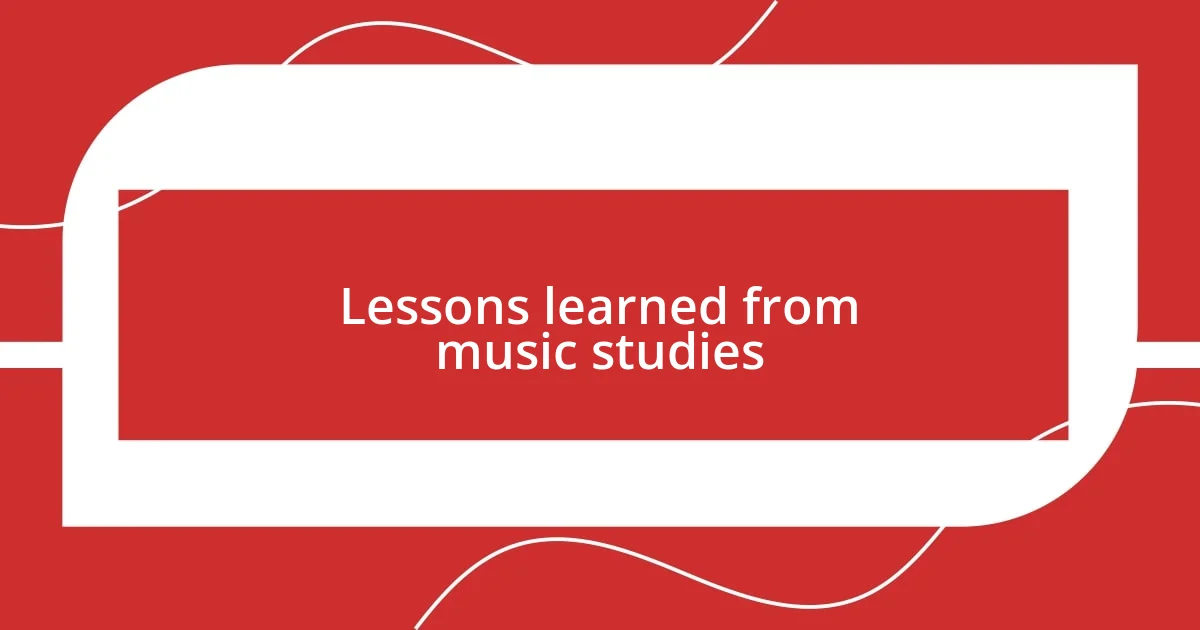
Lessons learned from music studies
Music studies have taught me that the narratives in lyrics can unveil hidden truths about gender dynamics. I remember attending a seminar where we dissected songs by artists like Taylor Swift and Alanis Morissette. The discussions revealed how storytelling in music often mirrors personal struggles with societal expectations. Have you ever listened to a song that made you feel seen and understood? It’s fascinating how lyrics can resonate with our own experiences, creating a powerful connection.
One vivid lesson I learned is that rhythm and melody can be as powerful as words in expressing female empowerment. I had an eye-opening experience during a workshop focused on feminist punk music. The raw energy of bands like Bikini Kill spoke volumes about reclaiming space and identity. It made me realize that music can be a vehicle for anger and joy alike, highlighting the spectrum of women’s experiences. Can you think of a genre that particularly captured your own feelings about femininity?
Finally, it’s striking how examining music through a feminist lens reveals not just the problems but also the solutions. I recall exploring the impact of folk music in protests, especially songs from artists like Joan Baez. They illustrate how collective experiences can turn into a rallying cry for change. It’s empowering to think of how these melodies have intertwined with movements for social justice. Have you ever felt the urge to join a cause after hearing a compelling song? I know I have, and it’s a testament to the profound influence music can have on our activism.



